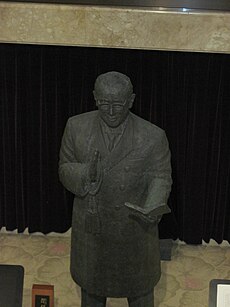Nikkyō Niwano
| Nikkyō Niwano | |
|---|---|

Statue of Founder Niwano
|
|
| Born |
November 15, 1906 Niigata Prefecture, Japan |
| Died | October 4, 1999 (aged 92) |
| Nationality | Japanese |
| Occupation | President of Risshō Kōsei Kai |
| Known for | Religious work, Founder of Risshō Kōsei Kai |
| Title | Great Teacher of the One Vehicle |
| Term | March 5, 1939-November 15, 1991 |
| Predecessor | None, Office Created |
| Successor | Rev. Nichiko Niwano |
| Spouse(s) | Sai Niwano |
Nikkyō Niwano (庭野日敬 Niwano Nikkyō?, 1906–1999) was one of the founders and the first president of the Buddhist organization Risshō Kōsei Kai.
Born on November 15, 1906 to farmers, Nikkyō had a humble life in a small town. Later in his youth he moved to Tokyo to work and it was here that he began to study several different religions. During his studies he attended a sermon on the Lotus Sutra and he became a Buddhist.
Mr. Niwano had been actively involved with the Buddhist group Reiyūkai, and it was then that he encountered Ms. Myoko Naganuma and lead her to convert to Reiyūkai. In 1938 they both attended a leaders meeting where the leadership of Reiyūkai made several comments stating that the Lotus Sutra was outdated. After discussing this matter with each other, they decided that they could not belong to an organization which held this type of view. On March 5, 1938 they founded Risshō Kōsei Kai, holding the first meeting in Mr. Niwano's house.
Mr. Niwano was to be the President and Ms. Naganuma to be the vice-president. As the organization grew he gave up his job as a milk man and devoted himself full-time to the ministry. He became involved in interfaith activities and helped to found the World Conference of Religions for Peace in 1970. During this time he became involved in numerous religious and cultural conferences and gathers, some of which include the Asian Conference on Religion and Peace and the 6th WCRP in Italy where he presided over the WCRP alongside Pope John Paul II. He also spoke on several occasions as the United Nations calling for world peace and the abolition of nuclear arms.
In 1991 he stepped down as president and was succeeded by his eldest son, Nichiko Niwano. Although retired, he continued to participate in interfaith and peace activities.
...
Wikipedia
